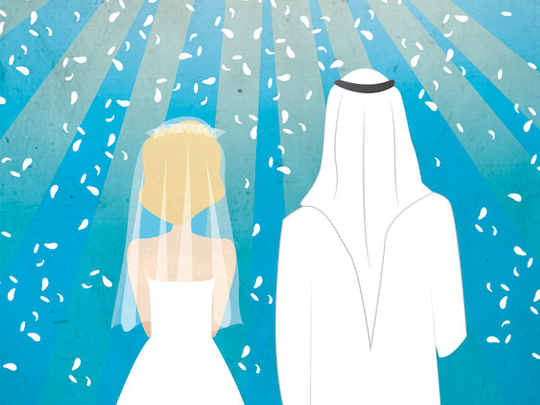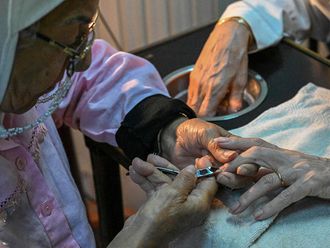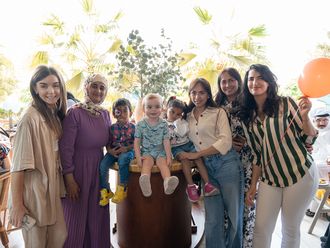
Abu Dhabi: There is nothing inherently right or wrong with mixed marriages, however, half-Emiratis will always be different in a country which places so much emphasis on being pure Emirati, Gulf News has learnt.
With the number of Emiratis marrying foreigners on the rise, the Federal National Council (FNC) has discouraged mixed marriages and encouraged Emiratis to marry their fellow countrywomen.
“The marriage grants should be granted to more Emirati men to discourage them marrying foreigners,” said Ali Eisa Al Nuaimi, an FNC member.
Dr Maitha Salem Al Shamsi, Minister of State and Chairwoman of the Marriage Fund, said the fund has always played an integral role in supporting coherent and stable families in the UAE by providing grants and spreading awareness.
“Many lectures have been held by the fund for parents across the UAE warning them of the negative impacts which might result from Emiratis marrying foreigners,” she said.
The fund has also increased awareness of religious, cultural and social family principles via campaigns across the country.
There were mixed views regarding the practice from half-Emiratis, with some saying being exposed to two cultures was a bonus while others said they struggled to fit in.
Sarah Al Ali, 25, who is half-Emirati and half-British, told Gulf News: “I believe that any mixed marriages in any society will have an impact on the children. You have two parents from different backgrounds and cultures raising a child, one is more open- minded and the other is more conservative.
“For me, I love being the outcome of a mixed marriage and two different countries, which I am really very proud of. I have two languages that I can speak and two different families that I respect.
“There is a widespread misconception that mixed marriages are more likely to end in divorce but my parents have been happily married for over 29 years and I know many other half-Emirati couples who have been married even longer,” Sarah said.
“When you choose to marry a foreigner from any society, you know you have to make changes on both sides,” she added.
Ameena Khalfan Al Jarman, 23, half-Emirati and half-Iranian, said: “Mixed marriages are not bad as everyone expects them to be.”
She said society was used to the practice of arranged marriages between Emiratis.
“I have read many articles and listened to various shows advising people against it — [marrying non-Emiratis] for example, what will happen to the kids if the parents divorce? Or can such a marriage break the cultural traditions in the UAE?”
Society always points out the negative consequences of mixed marriages, she said. It does not understand that traditions and customs evolve through time. Nothing remains the same; we cannot do what our grandfathers and mothers did.
“Why focus on divorce when the marriage has just started?” Ameena asked.
“Society will always see the difference as a bad thing, when it can be good. Statistics and numbers might be manipulated to serve a purpose. The law allows mixed marriages; however, society still cannot agree with it,” she added.
Bullied
Speaking to Gulf News, Hassan Abdullah Al Marzouqi, 23, said: “It is not easy being a half-Emirati. I was born in the UAE and raised by my American mother; however, I know little of the country’s culture and traditions. Thus, I have always been mistreated by Emiratis and been bullied and picked on at school as well as university,” he said.
“My parents are going through a divorce. It has not been an easy life with my father forcing traditions on my mother.”
When I marry I’m going to choose my partner carefully to avoid any social complications that might arise, Al Marzouqi, who studies electronics engineering at the Higher Colleges of Technology, added.
“There are a plenty of Arabic drama series screened on various television channels. Why don’t they produce a series narrating the experiences of different Emiratis, who married non-Emiratis and explain the positive and negative consequences of it,” he said.
“There is no major relation between mixed marriages and high divorce rates. It is individuals themselves who determine the outcome. I have seen mixed marriages fail and I have seen an equal amount flourish,” said Eliazia Mohammad, a 24-year-old Emirati.
Saeed Hareb Al Darmaki, a 23-year-old Emirati who is married to a Briton, told Gulf News: “I am completely for mixed marriages in the UAE; however, the blessing and permission of both families is a must otherwise various complications might arise.
“I do not think there is a relation between mixed marriages and a high divorce rate in the UAE. As I see it most divorces are common in arranged family marriages, where the couple find out they are not right for each other.
“Additionally, due to pre-marital relationships being forbidden, many women discover traits in their husband’s personality that they were not aware of and find difficult to tolerate.
“I believe increasing divorce rates are perhaps — as seen elsewhere in the world — a product of women’s increasing financial independence, which makes it more viable for them to leave unsatisfactory marriages,” Al Darmaki told Gulf News.
“Any marriage can fail or succeed. It is really down to the individuals. A mixed marriage may face a greater number of issues depending on the backgrounds — meaning differences in culture, religion and education — of the couple involved; however, differences can be overcome if the two parties work at it,” he added.
Divorce can exist in either mixed or arranged marriages; it can bring about changes in children’s characters and affect their mental and physical health.











